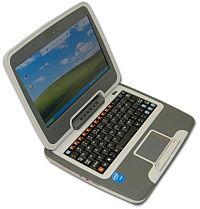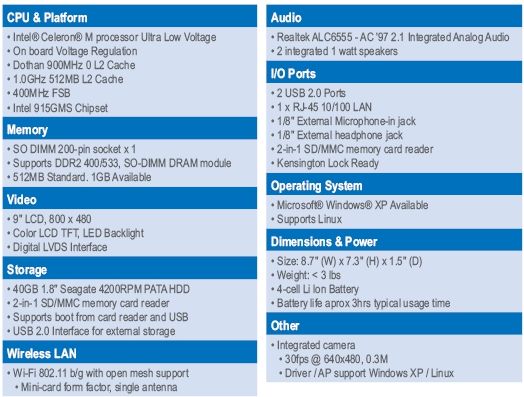This is a laptop for education. It has a low voltage processor, mesh networking, LED backlight screen, and even an integrated camera. It can also run Windows XP in addition to Linux.
Is this One Laptop Per Child's XO laptop? Or the Asus Eee PC? Or even the Elonex One?
No, it's Intel's new 2go PC, the Classmate 2, that Computer Technology Link is rumored to be selling for $400 or less retail in 60 days or less.
Thanks to Gizmodo, we even have a readable 2go PC spec sheet.
So what do these numbers say to you? For me, I want to take a moment to remember the original OLPC mission:
OLPC is not at heart a technology program and the XO is not a product in any conventional sense of the word. We are non-profit: constructionism is our goal; XO is our means of getting there.I don't think the 2go PC is better or cheaper. The XO laptop is still the market leader in hardware and price point. And if the recent restructuring can both reinvigorate XO sales and improve Sugar, Intel will be playing catch-up for years to come.It is a very cool, even revolutionary machine, and we are very proud of it. But we would also be delighted if someone built something better, and at a lower price.
But I do like what the 2go PC represents: a major shift in technology industry thinking towards faster, better, cheaper platforms that can empower education with technology.




I don't doubt that OLPC and specifically Nick Negroponte were the catalyst for the 'Cheap Laptop' revolution. Regardless of whether the original goal was to provide a digital education to Third World students, we now see a large number of manufacturers playing catch-up with Asus and its EeePC.
Before the concept of 'Low Spec-Low Price' laptops emerged you couldn't buy a laptop under $500. Now we are seeing every laptop maker announcing their own 'Low Spec-Low Price' machine. It makes sense from a business point of view. Even the price point has been set by Asus at $400 US.
It appears from the Classmate2 spec that its competing with the other Low Spec devices on the market and really has none of the innovation in hardware and software that the XO has. The Classmate2 is just another cheap laptop in an ocean of Low Spec machines.
Nice, but Intel seems to be following a different strategy than olpc. Olpc wants every student in the developing world to be able to afford a computer, so the plan for the XO is to keep the hardware specs constant, and take advantage of Moore's law and falling commodity parts prices so that the price can fall in a few years to something like $50.
Intel, at least on this evidence, seems to be following the traditional laptop oem strategy of steadily raising hardware specs so that the price can be kept at a constant level. As a consequence Intel will sell a lot of laptops and make a lot of money, but will not have remotely as positive an effect on the developing world.
You're assuming that OLPC will be around 'in a few years' and all the countries that bought XOs now (to keep the organization alive) will be in the market for round two. Intel's assuming there's a market for individuals who want to buy one, don't mind the prices, but want delivery, support and a warranty.
Not being an engineer, what do the numbers say to me? Nothing, to be honest. It doesn't tell me in the least which one is the better learning tool (to the extent that this is even possible), in particular for the developing world, which is the context I am concerned about.
*shrugs*
Clevergirl wrote:
"what do the numbers say to me? Nothing, to be honest. It doesn't tell me in the least which one is the better learning tool"
I couldn't agree more!
At this point, all the products (OLPC's, Intel's, Asus', etc.) are just cheap, underpowered computers. Some boast better features than others, but they all share the same "bottom line": potential buyers will be getting less than a fully-featured laptop in exchange for a lower price.
Nowhere in sight is the evidence that they will be useful to kids in elementary schools. Yes, it would be nice to give every poor (or rich) kid his/her own laptop. Nothing wrong with that, except that it ignores a very legitimate question:
Is this the best a poor (or rich) nation can do with its education dollars?
Would the money be better spent in hiring more or better teachers or fixing school buildings or buying school supplies or even using some of that money to provide brakfast/lunch to kids who come hungry to school?
If there is no discernible educational benefit to elementary school kids owning a laptop, why should THEIR education money be spent on something of no benefit to them?
Those are the hard questions that responsible, caring leaders will have to ask when considering this technological alternatives.
"2go PC represents: a major shift in technology industry thinking towards faster, better, cheaper platforms that can empower education with technology."
What!!!?????
faster!!!?????, better!!!!???? and cheaper!!!!????
I can get full laptops dual core, 2/3 GB RAM, 250 Disc, etc for that same amount.
How the hell can you say that selling underpowered, underspeced, expensive for what they are is moving towards faster, better and cheaper???
You are out of your mind! Really!
Do you also want rotten potatoes, shoes made of paper, living in a hut instead of a proper house and then say that living conditions are improving. Are you mad?
How can people show low common sense, and intelligence..
This device in particular shows all the same characteristics of this category of devices: Poor design, Poor usability, Ugly, Low Specs, High prices, Poor performance.
It's a fool's gold and nobody notice yet. How longer will people accept crap like that for such high prices. Wait for the crash...
It's such a pity that a REALLY innovative product like the OLPC is no where to be seen in most markets.
The OLPC offers the potential to provide usable ebooks to the kids which is especially significant for school districts whether they be 3rd world, inner city or rural. Whether it meets that goal is yet to be established. None of it's current 'competition' in low-cost notebooks even come close to addressing this need - the OLPC display is a true and significant innovation. Assuming you are using it to distribute textbooks, the OLPC is reasonably powered. Engineering is an exercise in compromise where price and performance are always a balancing act. At $200 per student, the OLPC is a debatable project (as in worth considering) at $400 it wouldn't even be a topic (not in my district anyway). Besides wondering if OLPC is going to be around for a while is whether the textbooks will be available - it doesn't matter if the XO has an awsome display if it has nothing to display.
Wayan,
"But I do like what the 2go PC represents: a major shift in technology industry thinking towards faster, better, cheaper platforms that can empower education with technology."
If the specs are to believed, 2go PC is pretty much the original Classmate PC with larger screen (although at the same low-res) and addition of the hard disk. Not sure about the mesh networking you mentioned as it's still using Wi-Fi 802.11 g/b (rather than 's' like XO). Of course, as the result of this changes, not only the robustness is reduced but both power requirements and price are going up as well - ie it's moving 'backwards' towards conventional laptops as we know them and the opposite direction OLPC is pulling the market. What on earth has Intel been thinking? Where's Atom processor we've been all expecting in the next version of Classmate PC? If I were to buy ultra-portable 'conventional' laptop surely the next version of Asus or the Acer [1] seem like much more advanced proposition.
OLPC, of course, is still in the class on its own: remember Brazil's considerations on TCO - surely this incarnation of the Classmate, with its increased price and power requirements on one hand and decreased robustness on the other, has even less chance (and it's struggling against XO as it is) to compete in the educational market in the developing countries...
[1] Acer new laptop to compete with Asus EEE on Price
( http://www.portal.itproportal.com/articles/2008/03/25/acer-new-laptop-compete-asus-eee-price/ )
Irvin: "At this point, all the products (OLPC's, Intel's, Asus', etc.) are just cheap, underpowered computers. Some boast better features than others, but they all share the same "bottom line": potential buyers will be getting less than a fully-featured laptop in exchange for a lower price."
I think you mean "lower-powered" rather than "underpowered". There are plenty of tasks for which the power of one of these subnotebook computers is sufficient.
I would also like to hear more about what your definition of "fully-featured". In relation to general-purpose computing, isn't that an unanswerable question -- or at least, one that's extremely sensitive to context?